To recognize the path and the house and the story behind it—it was the closest to clarity I felt on that trip. Not peace, but solidity. An unmistakable event from someone else’s life had left unequivocal evidence. McGahern’s life was lived among his people, his books written among his people. His characters, real and fictional, are no better and no worse than their creator, who—again unlike many of his brilliant countrymen—wastes no time in seeking originality. “The people and the language and landscape where I had grown up were like my breathing,” McGahern wrote toward the end of his memoir. It is only natural to return to the memories. There is relief in redrawing the boundary between suffering and feeling; there is joy, too.
The paths I walked by myself in Beijing are gone. Even if the city had remained unchanged, I have turned away from the people and the language and the landscape. Homecoming, in my case, would only be meaningful followed by leave-taking. A permanent homecoming would be a resignation. To be among people—does that require one to be at home with others, to be at peace with oneself? But an agitated mind does not know any road to peace except the one away from home, which time and again exposes one to that lifelong phobia of attachment, just as to write betrays one’s instinct to curl up and hide. Every word one says, every word one writes, every dream and fear and hope and despair one reveals to others and to oneself—they all end up like chicks refusing to be returned to the eggshell.
Memory Is a Melodrama from Which No One Is Exempt
One of the most callous criticisms of Stefan Zweig’s suicide along with his wife Lotte came from Thomas Mann. “He can’t have killed himself out of grief, let alone desperation. His suicide note is quite inadequate. What on earth does he mean with the reconstruction of life that he found so difficult? The fair sex must have something to do with it, a scandal in the offing?”
Death, except for someone entirely isolated, is always a personal moment made public. Suicide, among the most private decisions one can make, is often taken over by the public. Those who express strong feelings mistake themselves as the center of a story. The intense emotions around suicide—anger, pity, unforgivingness, even condemnation—demand what no one has the right to claim: an explanation, and the authority to judge the explanation.
One’s wish to die can be as blind and intuitive as one’s will to live, yet the latter is never questioned. A suicide can be dismissed as a drama gone awry and entering the realm of melodrama. If a tragedy makes us weep out of compassion and a comedy makes us laugh out of appreciation, a melodrama alienates and discomfits. When we cry, we cry under protest, suspicious of being manipulated; when we laugh, we laugh with the belief—doubtful—that we are beyond its absurdity. But this is a misunderstanding of melodrama. Tragedy and comedy involve an audience, so they must give—sharing themselves to elicit tears and laughter. Melodrama is not such a strategist. It meets no one’s expectation but its internal need to feel.
My intention is not to defend suicide. I might have done so at other times in my life, but I have arrived at a point where defending and disputing my actions are the same argument. Everything I say is scrutinized by myself, not only the words and their logic but also my motives. As a body suffers from an autoimmune disease, my mind targets every feeling and thought it creates; a self dissecting itself finds little repose.
In the ideal, argument is a commitment—both parties, by giving and taking, discover something new. But this belief is as naïve as a young person’s idea about the perfection of love. The possessiveness in human nature turns loving or arguing into something entirely different: winning, conquering, owning, destroying.
The talent of argument becomes about finding the right rivals—those who can be awed or bullied into agreement—and dismissing those who cannot be as irrelevant. That talent needs an audience. The world will always quote Mann on Zweig’s death. Yet the latter’s silence prevails.
There is another way to cope with the same autoimmune condition. A friend is good at arguing against herself from the perspective of others, even when she sees through the fallacy of their arguments. The mind, to avoid targeting itself, becomes two: one which, by aligning with others, is protected; and one which, by staying quiet, eludes being conquered. A self preserved by restraint is the self that will prevail.
—
MY SISTER HAD a classmate in college who was afflicted with lupus. She seemed sanguine about dying young, and indeed she had less than two years to live. Lying on her bunk bed in the dorm, she would talk about her boyfriend, who worked as a bodyguard for a wealthy family in Hong Kong, and the expensive dresses he bought her, which she was planning to distribute to her friends and classmates upon her death. When I read Elizabeth Bowen’s biography, I recognized the young woman’s impertinence in Bowen’s mother. When she was diagnosed with cancer in her forties, she talked cheerfully about her imminent death, only months away. The first time I met William Trevor, he told me where he would be buried. I visited the seaside Irish town the next summer. The trip was not made for sentimental reasons. I am still not much different from the person who watched unblinkingly the young woman in Beijing when she talked about the dresses that would outlast her. I have always believed that, between living and dying, from being to being no longer, there are secrets understood by those nearer death. I want to know them, too.
But knowing is not understanding. There is a moment in the hospital that I return to, when a nurse chased me down the hallway because I could not sit through a morning meeting where everyone was to state an achievable goal for the day. She was a stern-looking woman, slim built with hair dyed platinum. You have to understand, she said, a suicide attempt is selfish. Someone close to me said it was irresponsible; another said manipulative. Yes, I know what you mean, I said to each of them. Understanding cannot be willed into existence. Without understanding one should not talk about feeling. One does not have the capacity to feel another person’s feelings fully—a fact of life, democratic to all, except when someone takes advantage of this fact to form a judgment. One never kills oneself from knowledge or understanding, but always out of feelings.
—
IN LIFE WE shun melodrama, as its audience and, more urgently, as participants. In its original meaning, melodrama was the music that accompanied speech or pantomime onstage. Its purpose continues to be to evoke feelings rather than to narrate plot or create characters. But feelings carry value like currency. People like to think they have control over their feelings in connection with others. I feel for you, I’m happy for you, I’m angry on your behalf, people say; or else they say, You don’t deserve my love, sympathy, respect, or hatred. These words reflect a status. Those who feel can stop doing so if they want; and they will, if their expectations are not met.
When I was in the army—and for a time was in despair—I felt the only solution for life was the trigger of a machine gun. I could not bring myself to do it—though this could be a lie of memory, a revision to avoid other truths—because I was aware two people, whom I knew little, would have their careers and perhaps even lives destroyed by my action. The platoon leader and the training officer, who supervised the shooting drill, were both kind to me. They would not have had any idea of the melodrama playing out in my head. I can see clearly how I appeared to the world. My glasses had been broken in a combat drill, so I had to borrow a pair from a chemistry student for shooting practice. Her right lens had a similar prescription to mine, but the left lens was much stronger. At the range I would drape a handkerchief in front of my left eye to save myself from disorientation. A piratess, I remember laughing with a friend.
Читать дальше












